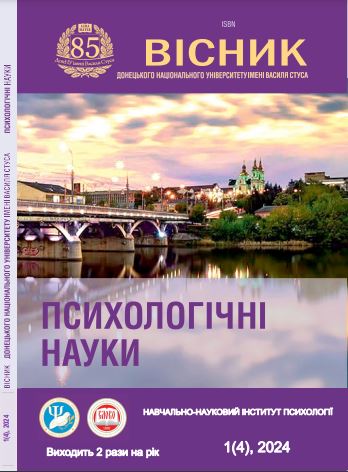Психологічні особливості адаптації здобувачів фахової передвищої освіти до освітнього процесу
DOI:
https://doi.org/10.31558/2786-8745.2024.1(4).3Ключові слова:
адаптація, здобувачі фахової передвищої освіти, заклади фахової передвищої освіти, освітній процесАнотація
Мета статті полягає у дослідженні психологічних особливостей адаптації здобувачів ФПО до нових умов освітнього процесу. Результати дослідження здобувачів за опитувальником Р. Кеттела, свідчить про те, що їх емоційно-вольові особливості є результатом комплексного поєднання різних особистісних рис, що включає в себе як позитивні фактори, так і складні аспекти, які потребують уважного та індивідуального підходу до їхнього розвитку та підтримки. За опитувальником К. Томаса найвищу схильність до стратегії «Суперництво» виявили здобувачі спеціальності «Видавництво та поліграфія, стратегії «Співробітництво» – спеціальності «Перукарське мистецтво та декоративна косметика», стратегії «Компроміс» – спеціальностей «Інформаційна, бібліотечна та архівна справа» та «Перукарське мистецтво та декоративна косметика», стратегії «Пристосування» – спеціальностей «Видавництво та поліграфія» та «Технології легкої промисловості», стратегія «Уникання» майже не виражена. Результати психологічної за опитувальником Т. Лірі свідчать про те, що більшість здобувачів спеціальності «Інформаційна, бібліотечна та архівна справа» виявили схильність до підозрілих та покірно-сором'язливих відносин, спеціальності «Видавництво та поліграфія» – до авторитарних та дружелюбних стосунків, спеціальності «Перукарське мистецтво та декоративна косметика» – до залежних та альтруїстичних відносин, спеціальності «Технології легкої промисловості» – до егоїстичних та дружелюбних відносин. Представлені результати свідчать про досить успішну адаптацію першокурсників до умов освітнього середовища. Опитування виявило, що більшість першокурсників сприймають освітнє середовище коледжу як комфортне і мають стабільний емоційний стан. Лише деякі здобувачі ФПО відчувають втому та сильний стрес під час виступів, мають невпевненість у власних силах та проблеми зі зосередженістю.
Ці результати випливають із тверджень, що більшість респондентів переважно ніколи не зазнають конфліктних ситуацій, не відчувають самотність, і лише іноді відзначають внутрішню напругу та страх перед викладачами. Розроблено профілактичну програму, спрямовану на забезпечення психологічного комфорту та успішної адаптації здобувачів ФПО, розвиток навичок адаптації, управління стресом, підвищення самооцінки та позитивного ставлення до навчання.
Посилання
Мельник О., Волкова С., Шеремет О. Психолого-педагогічні аспекти адаптації першокурсників в умовах пандемії. Нові технології навчання. № 96. 2022. С. 143-149.
Прокопенко В., Андрейко С., Дашевський І. Роль куратора у процесі оптимізації соціальної адаптації студентів медичних спеціальностей закладів фахової передвищої освіти. Вища школа. №1 (202). 2022. С. 79-82.
Савельєва Т. А. Педагогічні умови підготовки молодших спеціалістів сфери обслуговування на адаптивних засадах : автореф. дис. … канд. педаг. наук. 13.00.04 – теорія і методика професійної освіти. Харків, 2021. 22 с.

